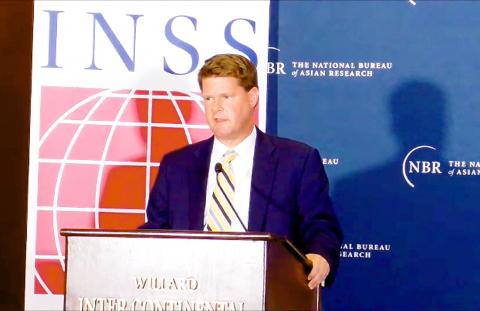In anticipation that China will try to meddle in next year’s presidential election, the US has started dialogue with Taiwan to help strengthen its ability to deal with the issue, a US official said on Wednesday.
“It’s a very important issue for us,” US Assistant Secretary of Defense for Asian and Pacific Security Affairs Randall Schriver said at the conclusion of a forum in Washington on Asian policies that touched on Taiwan’s presidential election.
“There’s no question in our minds that China will try to meddle, as it has done in every previous election,” Schriver said.

Photo: screen grab from the Internet
In 1996, it came in the form of missile exercises, he said, adding that in 2000, then-Chinese premier Zhu Rongji (朱鎔基) threatened Taiwanese voters.
Schriver was referring to an incident in 1996 in the buildup to Taiwan’s first direct presidential election in which China fired missiles into waters near Taiwan, apparently to dissuade people from voting for then-president Lee Teng-hui (李登輝).
Ahead of the 2000 presidential election, Beijing resorted to verbal threats, with Zhu warning voters not to vote for then-Democratic Progressive Party candidate Chen Shui-bian (陳水扁).
The biggest challenge facing Taiwan is the growing sophistication of the tactics used by China, Schriver said, adding that this time it is expected to use social media and cyberintrusions to interfere in Taiwan’s election.
Dialogue between the US and Taiwan has started, Schriver said, but declined to divulge details, adding only that the US would contribute to Taiwan’s abilities and expertise as the election approaches.
Also at the forum, American Institute in Taiwan Chairman James Moriarty said that the relationship between Taiwan and the US is governed not by policy, but by the US’ Taiwan Relations Act.
Taiwan is described as a beacon of democracy, which means that any Taiwanese younger than 35 has “democratic DNA,” he said.
“They expect to elect their leaders, they expect to be able to criticize their views, they expect to be able to throw out their own stuff,” Moriarty said.
After the forum, Moriarty told reporters that China should make sure its attempts to resolve cross-strait issues are acceptable to the people on both sides of the Taiwan Strait.
China’s “one country, two systems” formula is not helpful and not attractive to Taiwan, he added.

INVESTIGATION: The case is the latest instance of a DPP figure being implicated in an espionage network accused of allegedly leaking information to Chinese intelligence Democratic Progressive Party (DPP) member Ho Jen-chieh (何仁傑) was detained and held incommunicado yesterday on suspicion of spying for China during his tenure as assistant to then-minister of foreign affairs Joseph Wu (吳釗燮). The Taipei District Prosecutors’ Office said Ho was implicated during its investigation into alleged spying activities by former Presidential Office consultant Wu Shang-yu (吳尚雨). Prosecutors said there is reason to believe Ho breached the National Security Act (國家安全法) by leaking classified Ministry of Foreign Affairs information to Chinese intelligence. Following interrogation, prosecutors petitioned the Taipei District Court to detain Ho, citing concerns over potential collusion or tampering of evidence. The

‘FORM OF PROTEST’: The German Institute Taipei said it was ‘shocked’ to see Nazi symbolism used in connection with political aims as it condemned the incident Sung Chien-liang (宋建樑), who led efforts to recall Democratic Progressive Party (DPP) Legislator Lee Kun-cheng (李坤城), was released on bail of NT$80,000 yesterday amid an outcry over a Nazi armband he wore to questioning the night before. Sung arrived at the New Taipei City District Prosecutors’ Office for questioning in a recall petition forgery case on Tuesday night wearing a red armband bearing a swastika, carrying a copy of Adolf Hitler’s Mein Kampf and giving a Nazi salute. Sung left the building at 1:15am without the armband and apparently covering the book with a coat. This is a serious international scandal and Chinese

Seventy percent of middle and elementary schools now conduct English classes entirely in English, the Ministry of Education said, as it encourages schools nationwide to adopt this practice Minister of Education (MOE) Cheng Ying-yao (鄭英耀) is scheduled to present a report on the government’s bilingual education policy to the Legislative Yuan’s Education and Culture Committee today. The report would outline strategies aimed at expanding access to education, reducing regional disparities and improving talent cultivation. Implementation of bilingual education policies has varied across local governments, occasionally drawing public criticism. For example, some schools have required teachers of non-English subjects to pass English proficiency

TRADE: The premier pledged safeguards on ‘Made in Taiwan’ labeling, anti-dumping measures and stricter export controls to strengthen its position in trade talks Products labeled “made in Taiwan” must be genuinely made in Taiwan, Premier Cho Jung-tai (卓榮泰) said yesterday, vowing to enforce strict safeguards against “origin laundering” and initiate anti-dumping investigations to prevent China dumping its products in Taiwan. Cho made the remarks in a discussion session with representatives from industries in Kaohsiung. In response to the US government’s recent announcement of “reciprocal” tariffs on its trading partners, President William Lai (賴清德) and Cho last week began a series of consultations with industry leaders nationwide to gather feedback and address concerns. Taiwanese and US officials held a videoconference on Friday evening to discuss the